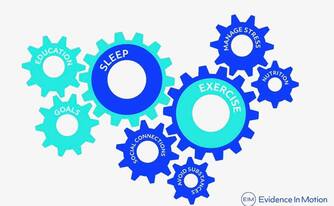
Jes Davies, PT, CFMT, CSCS, CMTPT, 500eRYT
(An ongoing, functional look at all the things affecting BRPT patients, their health and success.)
Have you ever sat down with an old friend and said, “Why have we let so much time pass? It’s been WAY too long since we have spent time together!”
That’s how I feel about my relationship with sleep.
(An ongoing, functional look at all the things affecting BRPT patients, their health and success.)
Have you ever sat down with an old friend and said, “Why have we let so much time pass? It’s been WAY too long since we have spent time together!”
That’s how I feel about my relationship with sleep.
I don’t struggle with exercise compliance. Since my children were born in 2000, I have been getting up early to allow time for movement before the household gets up, kids get to school, and I move on with my work day. It is not uncommon for my alarm to go off at 4 a.m., and many times my internal alarm wakes me up minutes before the alarm rings. Because of this I often live on 5-6 hours of sleep a night feeling like I was doing my best to manage all the parts of my life and setting an example for others of what a healthy lifestyle looks like.
I recently read a book on sleep science and learned that the most important number of hours of sleep are between 6-8. It is the time we are in more prolonged periods of REM sleep, when our emotions are processed, when our short term memory moves into long term storage and when our body heals. To me these sound like some pretty important things!! So I have started a NEW relationship with sleep. I've prioritized it in my day, now getting between 7-8 hours of sleep every night, and I feel SO MUCH BETTER. My mind is clear. My breath is steady. My daytime and night time cravings are fewer. And I only need my morning cup of coffee to get through my day.
So, your first piece of homework comes through building awareness of how much you really are sleeping. Start journaling when you go to bed, about how long it takes you to fall asleep, how many times you have sleep interruptions at night and when you wake up in the morning. Let’s gather some information before we start making some small but necessary changes together.
For more information regarding how sleep affects our everyday lives, check out Why We Sleep: Unlocking the Power of Sleep and Dreams by Matthew Walker.
I recently read a book on sleep science and learned that the most important number of hours of sleep are between 6-8. It is the time we are in more prolonged periods of REM sleep, when our emotions are processed, when our short term memory moves into long term storage and when our body heals. To me these sound like some pretty important things!! So I have started a NEW relationship with sleep. I've prioritized it in my day, now getting between 7-8 hours of sleep every night, and I feel SO MUCH BETTER. My mind is clear. My breath is steady. My daytime and night time cravings are fewer. And I only need my morning cup of coffee to get through my day.
So, your first piece of homework comes through building awareness of how much you really are sleeping. Start journaling when you go to bed, about how long it takes you to fall asleep, how many times you have sleep interruptions at night and when you wake up in the morning. Let’s gather some information before we start making some small but necessary changes together.
For more information regarding how sleep affects our everyday lives, check out Why We Sleep: Unlocking the Power of Sleep and Dreams by Matthew Walker.

 RSS Feed
RSS Feed